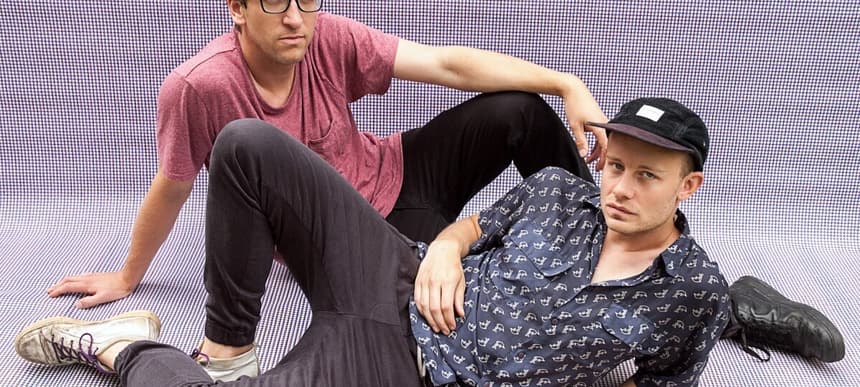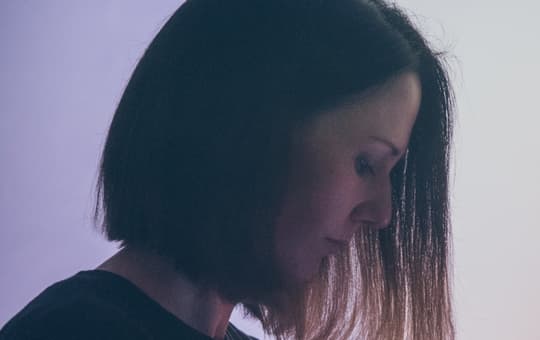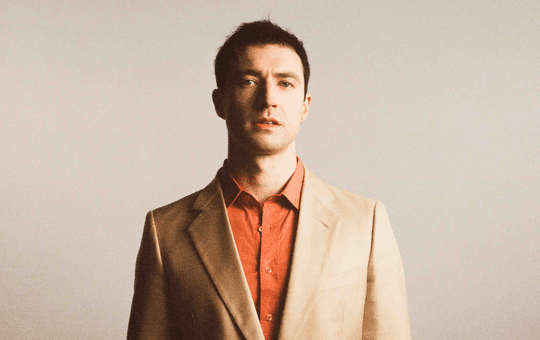
COMA: "We tried to develop something new."
Everything about Kompakt duo Coma’s process has become more streamlined for new record ‘This Side of Paradise’. Previously having had three years to work on and shape debut album ‘In Technicolour’, George Conrad and Marius Bubat gave themselves a tight deadline for their second record – a six month window to compile ideas and samples into something they could be confident in. While the duo don’t feel that their sound is perhaps the most Kompakt, they’ve happily been releasing on the historic label since 2009 and continue to have a great relationship with them.
‘This Side of Paradise’ sees Coma lean further toward pop sensibilities – weaving more vocals into the mix and giving the tracks a distinct journey. It’s a body of work that has made them feel less insecure about what they’re working on and also one that they worked on a bit differently, sending files to each other over the Internet and then later meeting up to work together in the studio. We caught the duo on Skype ahead of the album’s release on October 9th and discussed escapism in music, their history with Kompakt and not being DJs in a DJ saturated industry.
BONUS: Coma also gave us the first show of their cool-as-a-cucumber (literally) video for Lora. Taken from the album, it's a swaying masterpiece that hits all the right spots. Listen whilst you read the interview and find our why the duo should be up in all of your playlists.
I wanted to start with an observation. At the moment, I’ve been noticing a tension between dark, twisted and noisy sounds and serene and dreamy sounds in dance music. Your music occupies the second. Both feel like escapism in different ways from current situations and I wondered if escapism is an intention for you with your music.
Marius Bubat: “Yeah sure. I think it’s quite interesting because a couple of years ago, the whole electronic music industry got bigger and bigger. There’s so much different stuff going on and a lot of commercial stuff, EDM shit. I think that a lot of people will be maybe a little annoyed by some of that. There are two options to escape from this and one is to make it really rough but the way we do it is definitely the melodic way. But also we try to get away from the really, really straight beats.”
Are you not so interested in the more commercial side?
Marius: “Not so much. Speaking politically, you said escapism… it’s funny that you mention it because it was not intentional for us to do so but if you listen to our music, it can definitely happen. I think it’s a good point.”
I noticed the first album took three years whereas this record only took six months to make, what did you learn the first time around that made you want to change the process?
Marius: “I think if you’re working really hard during a long period on something then you lose the focus. It wasn’t the same thing when we did the first album because we had worked on it for three years, we got the singles together and we collected the ideas. This time, we didn’t have the time we had before so we had to collect everything in a really short period.”

Was there a reason you didn’t have the time that you had to work on the first album?
George Conrad: “No, we decided to do it like this. The first album is like the first child and you are super concerned, when you release the second you are more relaxed and confident in what you’re doing.”
Marius: “At a certain point you know when a track is finished and you also know whether an idea is not good enough and you have to throw it away. The first album helped us a lot in being a producer actually.”
Was it more difficult or easier to shorten the time limit on this?
Marius: “It was hard because if you put yourself under pressure like this, there’s always a lot of work and you can’t say “Okay we’ll wait until Kompakt says it’s a good record so we’ll drop it now.” You need to be your own boss and work really strictly. It was hard work but I think in the end it was a good idea to do.”
You were talking about Kompakt, you’ve been releasing with them since pretty much the beginning of you making music… what is it that keeps you coming back to them?
Marius: “Maybe we got used to it [Laughs]”
George: “No of course there’s been a long tradition and from the beginning on, released on Kompakt and they helped us develop as an artist. Of course there would be other options as well but right now, it really makes sense for us to.”
Marius: “It’s a really interesting story because it’s not a secret that Kompakt is more or less a club music label and it’s hard if you want to escape from this cliché. That’s what we would really like to do, playing more concerts than straight club shows for example. Then you start thinking maybe we should do it on another label but in the end, we must say that Kompakt is a special kind of label because you know that they are not putting in so much money as UK labels or something. But they will also you are free to do whatever you want and they will support you whatever you want. It’s not like they will drop if you one album is not successful and this is one fact that we really like about Kompakt.”
You were talking about wanting to do more concerts, do you DJ or do you just do your live show?
Marius: “We are stupid enough to carry 50 kilograms around with us in a small DJ booth and people are coming by and asking us if we can play this or that track. It’s weird, sometimes it happens. We are not DJs, there are so many people out there DJing at the moment because it’s got so easy with digital techniques. There are so many people DJing and to be honest, I don’t think that a lot of them are really like the DJs that we know from our past when people were nerds and bought records from the shops. They were really good in selection. Most of the DJs right now are also not DJing, they think that we have to play so many DJ sets because of that.”
George: “Right now, it feels like we have to emancipate from that because at some shows we are the DJs who play instruments but we want to get away from that and want to be accepted as real artists.”
Is it a conscious effort on your part to not be DJing because there are so few people doing consistent live sets in dance music?
Marius: “If it’s going to take place in a club you can’t really tell because sometimes we play in between DJs which is really hard because you’re not as loud as them and you’re a bit more eclectic. You don’t have a big selection.”
George: “There are tiny little differences where you can’t tell whether it’s going to work at a club or party or not.”
Marius: “You don’t have the control.”
In the same kind of area, I was wondering if you go out to clubs a lot, are you experiencing these environments?
George: “That’s a fun question because before we started doing music I think we went out a little more than Marius but since we started playing music and doing club shows, we almost hate to go to club [Laughs].”
Marius: “I think sometimes it’s fun to be on the road and play a club show and stay and stay to get wasted there but when we come back and have a weekend off, we don’t want to go into a club!”
George: “It feels a little claustrophobic when you go to the club privately and you find yourself thinking about the sound and the people and you don’t quite feel relaxed compared to the people who go to parties. I think it’s the same way directors can’t watch movies without thinking about small details and being able to enjoy the whole thing.”
You’ve been saying that this album is a more conceptual project for you – what made you want to inch towards that direction?
George: “Maybe because we wanted something different to the last album.”
Marius: “We tried to develop something new, which also sounds like Coma because it shouldn’t be totally new. It was part of the whole process that we said we want to do it in 6 months because we want to have it out in 2015. If you’re working on an album in a very short period, you know it will become more homogenic and conceptual and how it turned out in the end was a surprise for us also. In the beginning we decided which sounds we wanted to play with but what came out was a surprise.”

Could you talk more about the process of recording 'This Side of Paradise'?
George: “In the beginning, we were first working simultaneously to get ideas together and sort out what’s good for the album and what’s not. Also sound wise, setting limits to what you work with – the beats. We said let’s focus on a few samples we’ll use and not recording every single thing so that it could fit together.”
Explain a bit about the gear that you used to make the album.
George: “We use a lot of analogue stuff, basically the Roland Juno 60 and the Arp Axxe. For the whole album, it’s a mixture of old synthesisers and then at some point we started to use the beginner’s version of the Ableton sampler where you can just put a sample and start playing along because it gets pitched through the whole scale. It does totally weird things when you put in vocals or synth samples; sometimes we used outtakes from our synthesiser recordings where there was a mistake. That’s how we created most of the lead sounds and the vocal snippets that we used on the album.”
Marius: “We use it as a sequencer but we don’t use a lot of software synths, we like the whole sampling section in Ableton and how we’re able to create ideas in it but we’re not using the operator. Normally, we use analogue stuff from our studio.”
On the subject of Ableton and online software, you mentioned This Side of Paradise is very much a file-sharing album coming from the cloud, could you elaborate on that?
George: “It’s always difficult when you’ve got two people making electronic music sitting in front of the computer, then you’re going to kill each other. Due to us working so long together, we end up in horrible situations when we’re in the studio for a long time with each other. It’s not that we don’t like each other but to focus on what you’re doing, it’s better to do it this way. In the beginning, we shared files through the cloud and then at a certain point when we knew the album was going to be that way we met together in the studio.”
So you prefer to work separately rather than together in the studio?
Marius: “If you’re doing music together, sometimes you have too much fun with it and you lose the focus. That’s cool, we do it together and we’re friends but then in the end you show it to people and they’re like… I don’t know. If it’s like this, we work on something and send it to the other one, he’s very critical with it – it’s totally different. You don’t have those moments of having fun [Laughs]. “
George: “It’s also a matter of taste because our tastes are very difficult so it’s hard to stick to the same idea. On the other hand, that’s why it can also be good to find a way for them to work together. Marius is more critical than I, it’s also good because speaking aesthetically he has a finer sense in what you can do and what you can’t.”
Marius: “You can do everything but it’s more about if people understand. I think I’m definitely good at doing conceptual stuff and seeing a direction. George is collecting a lot of ideas more than I do.”
George: “90% of them are trash [Laughs].”
'This Side Of Paradise' is out via Kompakt on October 9th (pre-order).













